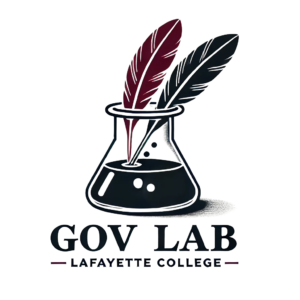The Lafayette College Gov Lab is a student-led, nonpartisan policy research group that applies social science methods to real-world governance problems.
Learn more about us and our research, meet our researchers, and stay up to date with us here.
Core
All members receive core training, which covers the following topics:
Experimental Design
Ethics
Academic Publication
Communication
Data Analysis
Project Management
Professional Development
Projects
Select students work on a project within a thematically focused research cluster:
Civic Engagement
Civic Consulting
Sub-Saharan Africa
Effective Government
Geopolitics
